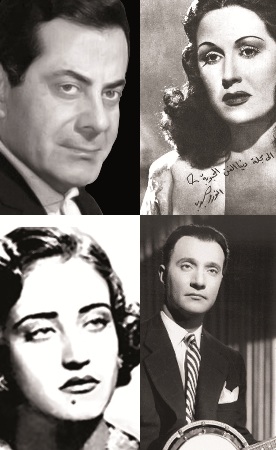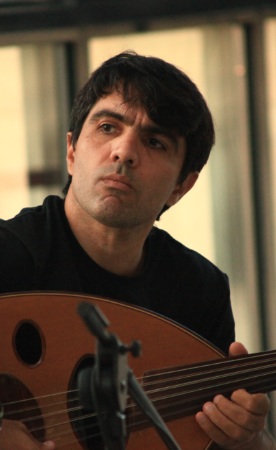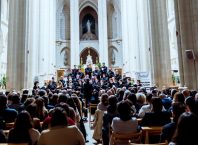Reports of the oud’s demise are greatly exaggerated, I am pleased to report.
To be fair, the presumed marginalisation of the oud is not entirely misplaced: after all, it is an esoteric instrument, not easy to master, comes coupled with the burden with millennia of history and tradition. But switch these around, and burdens become benefits. Esotericism engenders artisanship of the highest order, the following of a passionate, knowledgeable audience; dedication to the craft of playing the oud determines a healthy respect for its history, an awareness of its true place in the musical traditions of east and west.

Exhibit A for the defence: The Four Greats.
Presented by Arab Orchestra of Nazareth’s presentation at Jerusalem’s Sherover Hall, Four Greats celebrated the music and compositions of four heroes of 20th century Arab music – Muhamed al-Wahab, Farid al-Atrash, Asmahan and Layla Mourad – and was a fascinating journey into collective memory and nostalgia. All four were greatly beloved by their audiences in their lifetimes, larger than life personas giving sheen rather than substance to accomplished careers that transcended time and place.
The evening – part of the ongoing Jerusalem International Oud Festival – was designated a showcase, “a selection of the classics of four beloved and influential composers and vocalists.” The inference is that it was a celebration of a bygone age, but this scarcely does the event justice. The mixed audience (and how often does one find Arabs and Jews sharing common cultural ground, particularly in Jerusalem, the eternally divided city?) were knowledgeable, appreciative, a shared camaraderie evoked by the ghosts of singers past. Guest soloists Avi Cohen, Lubna Salameh and Mamun Zayud did not merely recreate what had been, but embodied the spirit and vitality of a rich tradition, one that does not necessarily inhabit the musical mainstream but nonetheless remains a highly treasured aspect of a communal heritage. This was hardly a remembrance of things past: rather, it was, by performers and audience both, a celebration of a shared history.
But enough of the past.

Exhibit B for the Defence: Chromatic Silence
The oud looks forward too, as Wisam Gibran demonstrated the night with Chromatic Silence, a solo recital at Confederation House. Born in Nazareth in 1970, the charismatic Gibran has spent most of his life studying, playing and composing with the oud. He has studied in Berlin and Moscow, played across Europe and the America: his influences take in flamenco and traditional Kurdish music, Jazz and Classical music. It will be hard to find a more rounded advertisement for the ecumenical characteristics embodied by the instrument.
Gibran has an understated, slightly self-deprecating stage presence. Introducing After The Last Sky, an original composition, he says that he took the title from the book of the same name by the political theorist and literary scholar Edward Said. “But don’t go and look for the book,” he continues. “There’s no connection. Not to the book, and not to Edward Said. I wouldn’t want you to look for some reference to the music in it. I just liked the title…”
But there is a connection to between Gibran’s music and Said, at least tangentially. Gibran explores the complexity of social and political conflict through his music, he says: seeking a musical idiom and identity that reflects the reality of everyday life. Chromatic Silence, he are told, examines the shades of silence in different traditions of oud playing.
A sense of scepticism comes with the territory whenever artists – irrespective of medium – make claims for their art penetrating the complexities of political and social life. The truth is that very often, art is the mirror rather than the mediator; it tells us how we live, rather than how to live. To his credit, Gibran recognises this. In between songs, he talks about the inspiration for his compositions: his travels and observations, Lacan’s mirror stage and its role in shaping identity, the notion of Galut, diaspora, as a place for creativity. “Israel is not the homeland, it is a land of diaspora,” he says. And around this he plays, fluently, lyrically, a mixture of original compositions and improvisations that draw upon his wide repertoire of influences.
Perhaps Gibran might be on to something. Music is more than the mirror sometimes. He returns to an integral aspect of his music repeatedly whilst chatting between songs. Untidiness. He is proud of the untidiness of his music, Gibran says. It is a more natural state than purity. He spent time working with Daniel Barenboim and East-West Divan in Germany, he says. A noble project, a worthwhile project, but ultimately too sterile. Not natural.
And so the oud, with all its complexity, remains relevant, albeit in ways we may not immediately recognise.






Comments are closed.